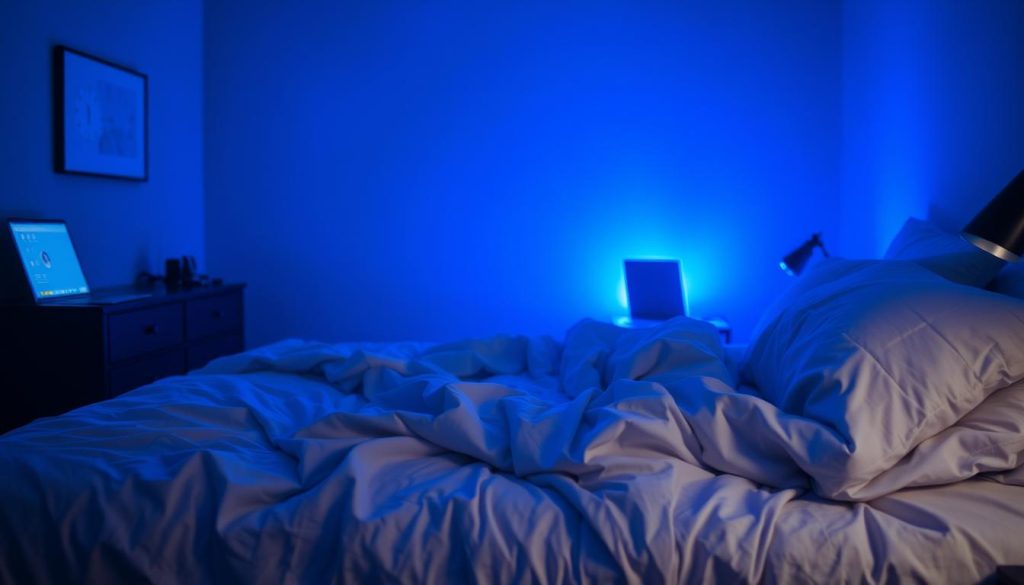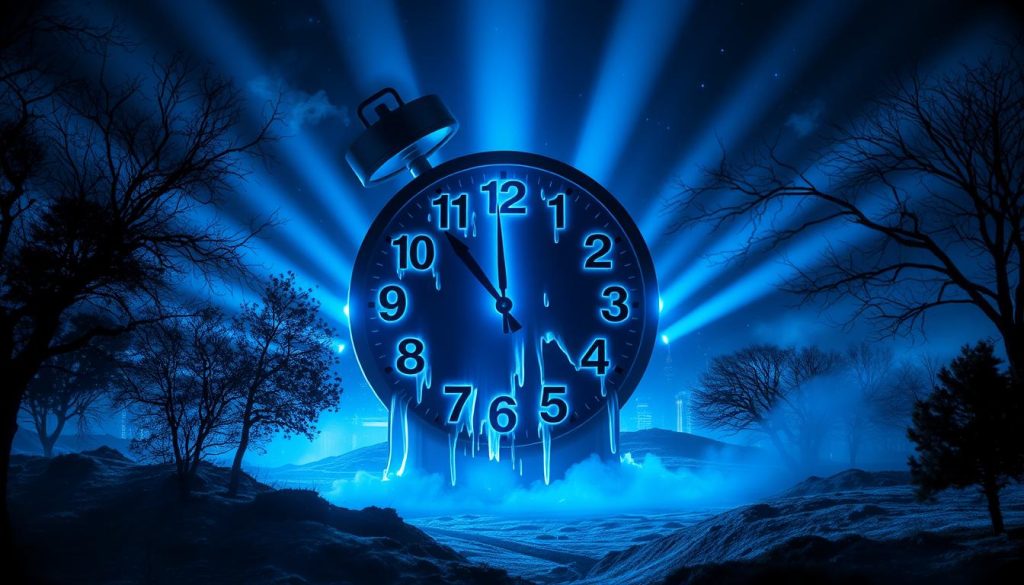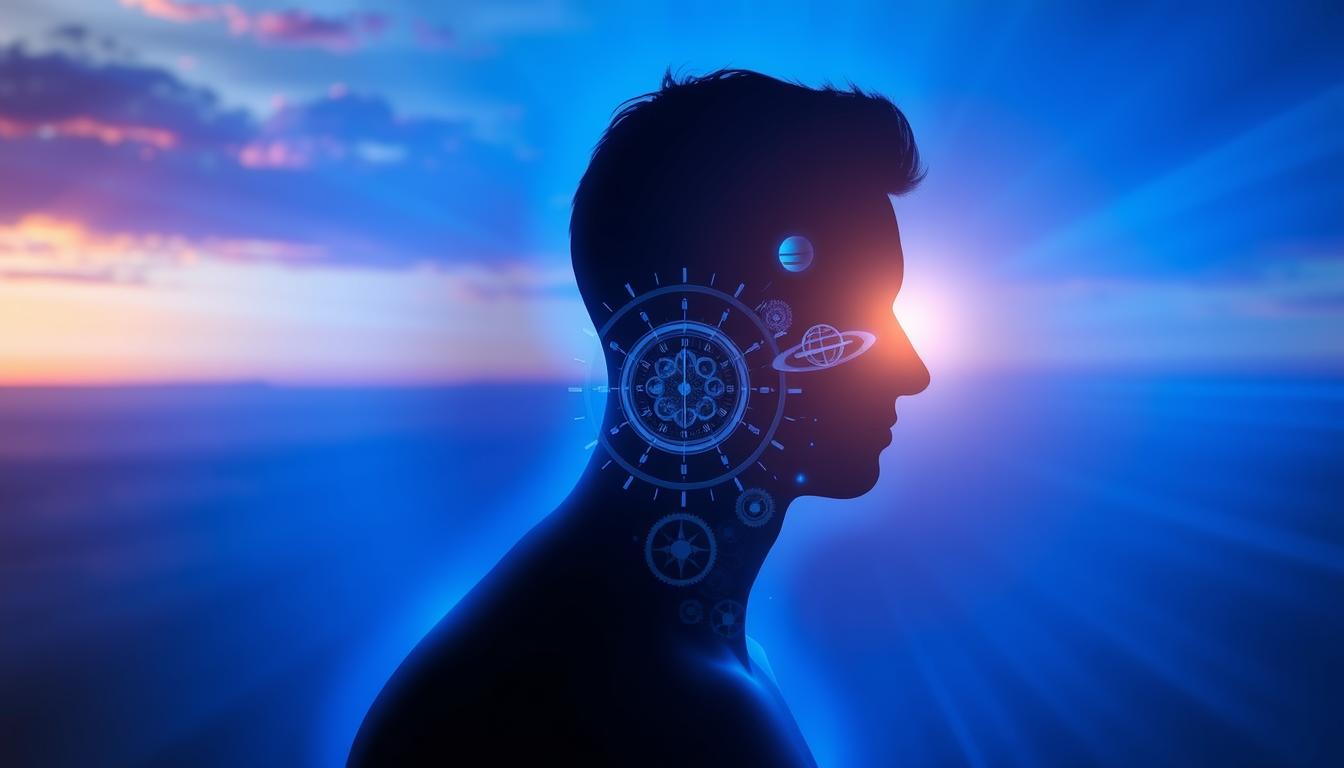Exploring our body’s internal clock, the circadian rhythm, is captivating. It controls our sleep and many other bodily functions. Blue light from screens and lights affects this rhythm, leading to sleep issues.
Understanding how blue light impacts our circadian rhythm is crucial. It’s not just interesting; it affects our health in today’s digital world.
What is Circadian Rhythm?
Understanding circadian rhythm is key for better sleep and health. It’s a natural process that controls our daily life. It affects when we sleep and eat.
Definition of Circadian Rhythm
The circadian rhythm is a cycle that happens every 24 hours. It controls our body’s functions like sleep and hormone release. Light exposure helps keep our rhythms in sync with the world.
Importance of Circadian Rhythm in Daily Life
Keeping a healthy circadian rhythm is crucial. Disruptions can cause sleep problems like insomnia. This affects our health and work performance.
Regular sleep helps our brain and mood. Following practices that support our rhythms leads to a better life.
The Role of Light in Circadian Rhythm
Light is key to our daily lives, especially in setting our circadian rhythms. Knowing how natural light affects our body is crucial for health. It helps our body make melatonin, the sleep hormone, by telling us when it’s day or night.
When we get sunlight, our body knows when to be awake and when to sleep. This helps us stay alert and relaxed at the right times.
How Natural Light Affects Our Body
Natural light does a lot for us. It makes us feel better, more alert, and improves our overall health. When the sun comes up, light tells our body it’s time to be awake.
This light stops our body from making melatonin during the day. Without sunlight, especially at night, our body starts making melatonin. This makes us feel sleepy.
The Biological Clock: An Overview
Our biological clock is in the hypothalamus and controls many body functions. It keeps our metabolism, hormone levels, and mood in sync with day and night. It listens to light to know when to wake up or go to sleep.
Understanding and following our biological clock helps us stay healthy and sleep better. It makes our daily life easier and more enjoyable.

Circadian Rhythm and Blue Light
In today’s world, blue light is everywhere. Knowing where it comes from and how it affects us is key to good sleep. Devices like phones and computers give off blue light, messing with our natural sleep cycles.
Sources of Blue Light in Our Environment
Many things in our lives emit blue light. Here are some common ones:
- Smartphones and tablets
- Computers and laptops
- LED and fluorescent lighting
- Televisions
The Impact of Blue Light on Sleep Patterns
Being around blue light too long, especially at night, can mess with our sleep. Using devices late at night can:
- Lower melatonin levels, the sleep hormone
- Make it hard to fall asleep
- Make our sleep less deep
Knowing this helps me control my screen time at night. Making smart choices can improve my sleep quality.

Health Implications of Disrupted Circadian Rhythms
Disrupted circadian rhythms can harm our health in many ways. When our biological clock is off, it affects our mental and physical health. It’s important to understand these effects to stay healthy and happy.
Effects on Mental Health
Disrupted circadian rhythms can deeply impact our mental health. Many people feel more anxious and depressed when their sleep is irregular. Studies show that sleep disorders can lead to mood swings.
Keeping a regular circadian rhythm helps keep our mood stable. It also improves our mental clarity.
Physical Health Consequences
Disrupted circadian rhythms can also harm our physical health. Irregular sleep patterns are linked to obesity, heart disease, and diabetes. When our body’s internal clock is off, it can disrupt metabolism, leading to weight gain and heart risks.
Sticking to a consistent sleep schedule can improve our physical health. It can also lower the risk of serious health problems.

Ways to Mitigate Blue Light Exposure
Managing blue light exposure can greatly improve sleep and health. By using effective strategies, I reduce the harm from too much screen time. Here are some tips to help cut down on blue light in my daily life.
Adjusting Screen Time Habits
Following the 20-20-20 rule is a simple way to manage screen time. It means taking a 20-second break every 20 minutes to look at something 20 feet away. This not only reduces eye strain but also promotes better viewing habits.
I also try to limit screen time before bed. This helps my body relax and get ready for sleep.
Use of Blue Light Blocking Glasses
Blue light blocking glasses have been a game-changer for me, especially at night. They block light that can mess with my sleep cycle. Wearing them before bed helps me relax and prepares my sleep space.
Creating a Sleep-Friendly Environment
Creating a good sleep environment is key for quality sleep. I use dim lighting in the evening to signal it’s time to relax. Blackout curtains keep my room dark, stopping outside light from waking me up.
Having a consistent bedtime routine also helps. It makes my sleep more restful and refreshing.
Improving Your Circadian Rhythm
To improve my circadian rhythm, I focus on solid sleep hygiene. A consistent sleep schedule is crucial. Going to bed and waking up at the same times every day, even on weekends, helps keep my internal clock in balance. This makes a big difference in how I feel during the day.
Being outside in natural light during the day helps regulate my sleep-wake cycle. Spending time outside, especially in the morning, sends a signal to my body. Regular exercise boosts my energy and supports a healthy lifestyle.
My diet affects my sleep patterns a lot. Eating a balanced diet and cutting down on caffeine, especially in the afternoon and evening, improves my sleep. Avoiding heavy meals before bed is also key. Instead, I have light snacks when I’m hungry.
Having a calming pre-sleep routine is a cherished habit of mine. Activities like reading or meditating help my body relax. This routine is essential for a good night’s sleep.
| Tip | Benefits |
|---|---|
| Maintain a consistent sleep schedule | Helps regulate the body’s internal clock |
| Increase exposure to natural light | Reinforces the sleep-wake cycle |
| Engage in regular exercise | Boosts energy and promotes overall health |
| Follow a balanced diet with reduced caffeine | Improves sleep quality |
| Create a calming pre-sleep routine | Enhances relaxation and prepares for sleep |
Conclusion and Final Thoughts
Thinking about our circadian rhythm and blue light awareness has taught me a lot. It shows how natural and artificial light affect our body’s clock. This clock is key to good sleep and health.
Blue light from screens can mess with our body’s clock and make it hard to sleep. But, we can fight this by changing how we use screens and making our sleep space better. These simple steps help us sleep better and feel healthier.
By focusing on our well-being, we can live better lives. I urge everyone to think about these things and make choices that help us sleep and feel better. By understanding blue light and our body’s clock, we can make our lives better.

